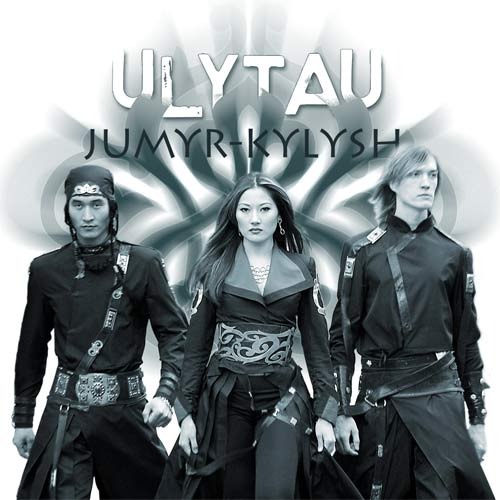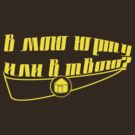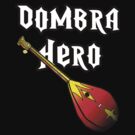Jumyr Kylysh or Two Warriors
 Chris Merriman was kind enough to lend me Ulytau’s most recent album, Jumyr Kylysh which is being released in English as Two Warriors. I suppose the name change is because Jumyr Kylysh seems to mean
Chris Merriman was kind enough to lend me Ulytau’s most recent album, Jumyr Kylysh which is being released in English as Two Warriors. I suppose the name change is because Jumyr Kylysh seems to mean “round ball” in Kazakh. Non-Kazakhs, who have never heard of Ulytau, would not expect an album called Round Ball to be metal/folk/classical fusion rock. Or is there some other explanation? Does anyone have ideas on this? Is my translation even correct? “Curved Sword” in Kazakh, presumably a reference to scimitars. Why they changed the name in English, I don’t know.
Anyway, on to a review of the album itself. It’s a solid release from the band that features a domibra player, a metal guitarist and a violin player as well as a rhythm section of drummer, keyboards and a bass-player. If you’ve heard Ulytau before, the tracks on this album are not a surprise. If you haven’t, think Vanessa Mae and other classical/rock/prog-rock/electronic pop fusion bands that are influenced by Yes, Metallica, and Bach. What Ulytau adds to this admittedly small but popular genre is the Kazakh influence. The sound of the dombira itself is quite unique. While a guitar can also double as a rhythm or a lead instrument, the way the dombira is plucked adds a percussive quality to the tune.
Beyond that, seven out of the ten tracks on Jumyr Kylysh are Kazakh folk songs. The other three are classical works, but the one of them is the Turkish inspired Turkish March by Mozart. The other two are Bach’s Toccata and Fugue in Dminor and Winter from Vivaldi’s Four Seasons.
In general, Ulytau is a talented ensemble and there are no flaws in their playing or their arrangements. They tend to err on the side of melodiousness in this particular album, which I appreciate because some of their other works (and works by other Kazakh musicians who use electronica in their tunes) has erred on the side of pop, with sweet keyboard melodies or hard hitting beats. It’s certainly one of their best albums. I am particularly fond of their arrangement of the well-known (in Kazakhstan, of course)Ata Tolgauy. It’s been covered by Urker, among others, and shows up as incidental music at concerts, plays, in TV shows and movies. With it’s simple melody, you’d think I’d be sick to death of this tune. But their arrangement of it starts off as a poppy ballad complete with synth pan-pipes, then moves to an acoustic-guitar driven rhythm section, making it sound like the Eagles or Dan Fogelberg. The distorted guitar comes in, without being overbearing, and brings us to a counter theme. Toward the end we get the tune in a more traditional setting, with violin and guitar playing the melody in unison, and the dombira in the background. It’s a clean, little arrangement that never gets boring, but doesn’t overshadow the tune itself.
Their cover of the Turkish March is also fun as they switch around with which instrument plays the lead melody. The disco-funk vamp intro, which reappears half-way through the song to back up a Kazakh melody, promises something a little more fun that never gets realized. Yapyr-Ai, a ballad, is nicely placed in the middle of the album as it’s a fairly straight-forward tune without a lot of production effects. It sounds like Asylbek Enseppov could have done it and it refreshes the ear from all the prog-rock.
The biggest disappointment is probably the Toccata and Fugue. It’s a tune that the whole world knows so it’s hard to do something original with it. And Vanessa Mae got big doing a rock-fusion version. Here Ulytau basically covers Vanessa Mae covering Bach. Except for the “Here We Go Now” and some of the more overtly techno parts of Mae’s version, this pretty much sounds like Mae.
Overall, this is a solid album, and an excellent introduction to the talented group. I do hope that in the future they will explore other genres of music and choose a few more obscure tunes or even move into composition, but I will definitely be making a trip to the record store (am I showing my age?) to pick this album up.
It’s being sold now in Kazakhstan in record shops and is also available on Amazon.com or off of iTunes as an MP3 download under the nameTwo Warriors. You can get the whole album or download individual tracks. Interestingly the band’s official website lists Paramount Records as the producer of the album, so perhaps it is available for purchase in Western countries.
Ulytau consists of Nurgaysha Sadvakasova (violin), Max Kichigin (solo-guitar), Erzhan Alimbetov (dombira), Novel Adonin (keys), Evgeniy Sizov (bass-guitar), Igori Dzhavad-Back (percussion) and is the brainchild of producer/musician Kydyrali Bolmanov.









